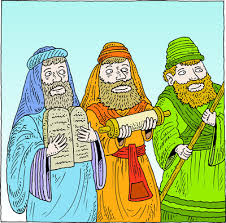Matthew 23:13 – But woe to you, scribes and Pharisees hypocrites! For you shut the kingdom of heaven in people's faces. For you neither enter yourselves nor allow those who would enter to go in.
Now from verses 13-30 we find 8 'woes' denounced against the religious leaders by Jesus. A woe is defined as "grief, sorrow, misery, heavy calamity".
It is important to notice that Jesus is not cursing these men. The woes are actually a serious yet compassionate warning about the terrible consequences that these stubborn sinners were bringing on themselves. The original Greek word contains an element of profound pity – Jesus is saddened by the terrible misery these men have chosen for themselves.
 In most of the 'woes' Jesus tells the religious leaders that they are hypocrites. They have deceived themselves and others. They are wearing masks of godliness, which hide their corrupt and polluted hearts.
In most of the 'woes' Jesus tells the religious leaders that they are hypocrites. They have deceived themselves and others. They are wearing masks of godliness, which hide their corrupt and polluted hearts.
So we would expect these great calamities to come upon the religious leaders, unless they repent and make some serious changes in their lives immediately.
It's kind of interesting to note that you don't hear a lot of "hell, fire and brimstone" sermons these days. Yet, the last public teaching of Jesus was along those very lines! We too, should not neglect to warn people about the wrath that will come upon them for rejecting Jesus as Messiah.
The first woe describes how these leaders keep people out of the kingdom of heaven. As the religious leaders who sit in Moses' seat, they were given the keys of knowledge regarding the word of God. As always, knowledge and understanding of the word of God points the way to the Messiah. It 'opens' the door of salvation.
But they withheld the correct interpretations of the ancient prophesies concerning the messiah. They were just like many of their forefathers:
Malachi 2:7-8 – For the lips of a priest should guard knowledge, and people should seek instruction from his mouth for he is the messenger of the Lord of hosts. But you have turned aside from the way. You have caused many to stumble by your instruction. You have corrupted the covenant of Levi, says the Lord of hosts.
The Scribes and Pharisees taught false doctrines, elevated their traditions above the word of God, opposed Jesus themselves, and attempted to convince the Jews that Jesus was an imposter. They even barred believers in Jesus from the synagogues. They used every influence they had and did everything they could to hinder people for believing in Jesus.
Great calamity and destruction (both in this world and in the next) awaits those who not only refuse to enter then kingdom themselves, but shut the door for others.
By contrast, it is a great blessing to be able to send the word of God out into the world for people to find. There are many wonderful ministries that spread the gospel through television and through the written word. In addition to these opportunities, you and I can personally share the gospel with people we know. We can help open that door of salvation, rather than blocking it!
Matthew 23:14 – Woe to you, scribes and Pharisees, hypocrites! For you devour widows' houses and for a pretense you make long prayers, therefore you will receive the greater condemnation.
The second woe centers around covetousness and the love of money. The Scribes and Pharisees had done their best to hide these sins under a mask of virtue.
We have already noted that it was a common practice of the Scribes and Pharisees to go into public places and spend hours praying. Although these prayers were a sham, it gave them the appearance of being extremely holy and close to God.
Because they seemed so holy, widows would become devoted to them and would regard them as their spiritual leaders. The Scribes and Pharisees would then use their influence to convince these widows to give their entire estates (or at least a big part of them) to the temple. As temple funds provided for the support of the Pharisees, they were deceitfully lining their own pockets when doing this; yet they appeared holy in front of the people.
 What an evil and cunning practice! It becomes even more foul when we recall that God had mandated the special care and protection of widows and orphans because they were vulnerable people!
What an evil and cunning practice! It becomes even more foul when we recall that God had mandated the special care and protection of widows and orphans because they were vulnerable people!
This practice is still somewhat common today. Many people consider "TV ministers" to be guilty of this same deceitful practice. While some certainly are, we should be sure to judge them on an individual basis.
We should never blindly follow any spiritual guide. We need to be in the word of God for ourselves; anything that a minister publicly speaks needs to line up with the written word of God. Further, we should always seek God for wisdom in how to use our financial resources.
Matthew 23:15 – Woe to you, scribes and Pharisees, hypocrites! For you travel across sea and land to make a single proselyte and when he becomes a proselyte, you make him twice as much of a child of hell as yourselves.
Woe #3 concerns converts to the faith. A proselyte was a convert to Judaism. The Jews almost always had some amongst them (Exodus 12:37-38, Acts 2:10, etc). As a proselyte, they were circumcised and had to conform to all the rites of the Mosaic Law.
There was nothing wrong with proselytizing, or winning converts to Judaism. There was nothing wrong with the evident zeal that the Scribes and Pharisees used to win them. Even today, as Christians, we are to be about the work of gaining converts to Christ. This is an essential part of being a citizen in the kingdom of God.
However, once a convert was gained, the Scribes and Pharisees paraded him around like a prize. Their pride swelled as they gained praise and adoration from other Jews for increasing God's flock, and for all the efforts they expended in winning them.
Then, they took these converts, put them under their power and authority, fed them corrupt doctrine, and trained them in their own forms of wickedness. Thus, they became a 'child of hell'.
The term "child of hell" was a common Hebrew phrase. It signified 'to be deserving of hell, to be awfully wicked'. 'Twice as much' simply means even more, or to a greater degree than the Pharisees themselves.
We too are to engage in the work of leading people to Christ. Once they have accepted Christ as Lord and Savior, we are to disciple or train them. We are not to be puffed up or prideful about this. Rather, we should be humbly grateful for a chance to assist them in their spiritual journey, as we all grow together in Christ.
Matthew 23:16-18 – Woe to you, blind guides, who say, 'If anyone swears by the temple, it is nothing, but if anyone swears by the gold of the temple, he is bound by his oath'. You blind fools! For which is greater, the gold or the temple that has made the gold sacred? And you say, 'If anyone swears by the altar, it is nothing, but if anyone swears by the gift that is on the altar, he is bound by his oath'.
In woe number four, Jesus calls the spiritual leaders blind guides, because they lead others in making dangerous mistakes. When the blind lead the blind, they both fall into trouble!
This woe has to do with the way the Scribes and Pharisees used oaths. An oath is really a conditional curse, which a person calls down upon himself from God, if he fails to tell the truth or keep a promise. Sadly, oaths became necessary because mankind does not keep his word, or tell the truth.
There was a legitimate need for oaths. It arose from situations in which there were no eyewitnesses. For example:
Exodus 22:10-11 – If a man gives to his neighbor a donkey or an ox or a sheep or any beast to keep safe and it dies or is injured or is driven away, without anyone seeing it, an oath by the Lord shall be between them both to see whether or not he has put his hand to his neighbor's property.
In this case, one man would swear an oath to the Lord that he had not intentionally harmed his neighbor's property. This oath was considered binding. Its purpose was to end any strife, dispute or argument over the matter at hand. The Israelites were commanded to swear by God's name when they used an oath (Deuteronomy 6:13 and 10:20).
However, the Jewish religious leaders were making a mockery of oaths.
First of all, remember that an oath is an appeal to God, to his omniscience and justice. If the person is lying, then God will judge the liar. So their first mockery of oaths was to allow men to swear by things other than God. For instance, they sometimes swore by the temple, or the gold, or the altar. These were mere objects (the work of men's hands), servants of God's honor. When men swore by them, they put the object in the place of God. How ridiculous! Imagine gold having the ability to judge the inward thoughts and motivations of a man's heart and having the power to execute judgment. It's absurd! So, all of these types of oaths (where they swore to anything other than God) were a mockery of God.
 Secondly, they tried to claim that some oaths were not binding. For instance, if a man swore an oath by the temple, that was a non-binding oath. You didn't have to tell the truth or perform the action that you swore you would. (I have to wonder, what was the purpose of an oath that was not binding??)
Secondly, they tried to claim that some oaths were not binding. For instance, if a man swore an oath by the temple, that was a non-binding oath. You didn't have to tell the truth or perform the action that you swore you would. (I have to wonder, what was the purpose of an oath that was not binding??)
However, if you swore by the gold of the temple, they considered that a binding oath. In this case, you had to tell the truth or perform the action you swore you would.
Since the intent of an oath was to end any doubt that you were telling the truth, all oaths should have been binding, even though they swore to the wrong thing. Making the oath non-binding was a breach of faith no matter what you swore by. Again, they are making a mockery of the very serious matter of taking an oath.
Jesus points out the absurdity of their distinctions regarding oaths, by calling them fools and blind guides. They are missing the point of oaths entirely; and they are lightly esteeming the judgment of God in an oath.
Matthew 23:19-22 – You blind men! For which is greater, the gift or the altar that makes the gift sacred? So whoever swears by the altar swears by it and by everything that is on it. And whoever swears by the temple swears by it and by him who dwells in it. And whoever swears by heaven swears by the throne of God and by him who sits upon it.
The leaders believed that the gold was more important than the temple, and that the gift was more important than the altar.
Jesus points out the error in their thinking. The temple was a building that was sacred to God. Therefore, any gold that was within it was holy because the temple was holy. If the same gold happened to be located in any other place, it would NOT be sacred. Therefore, the temple is greater than the gold.
The same is true for the gift and altar (this refers to the altar of burnt offering, located in the outer court of the temple where animals were sacrificed). The altar is holy to God. It is the altar that gives holiness to the gift (lamb, bull, ram, etc). If the gift were at any other location, it would not be holy.
 Jesus reveals that their thinking is deluded by their greed. The thing that is most important to them is the gold or the gift, because these are the things that will go into the temple treasury to support their lifestyle or put food in their mouths.
Jesus reveals that their thinking is deluded by their greed. The thing that is most important to them is the gold or the gift, because these are the things that will go into the temple treasury to support their lifestyle or put food in their mouths.
Jesus removes all of their foolish convoluted rules regarding oaths and replaces them with the truth: The essential thing in an oath is calling on God to witness the sincerity of the individual, because God alone can see and judge correctly. Anything else is a wicked and foolish swearing.
Why not just avoid the need for oaths by telling the truth and being a person of your word?
Matthew 23:23 – Woe to you, scribes and Pharisees, hypocrites! For you tithe mint and dill and cumin, and have neglected the weightier matters of the law: justice and mercy and faithfulness. These you ought to have done, without neglecting the others.
The next woe (the fifth) pronounced against the Scribes and Pharisees is that they are neglecting the most important aspects of the law. In this woe, Jesus has three important points to make.
One: The law required the Jews to devote a tenth part (10%) of all their property to the support of the Levites and the temple services (Numbers 18:20-24, Leviticus 27:30-33). The Scribes and Pharisees were stringently and meticulously keeping the law of tithing, even down to giving 10% of worthless herbs.
Two: There were parts of the law that were more important than herb-tithing. As the religious leaders of Israel, they should have been involved in bringing about justice for the oppressed, including widows and orphans. They should have been involved in showing mercy to people, and easing the suffering of the poor, instead of loading them up with burdens. They should have been faithful to carry out their duties as religious guides of the people. They should have been looking for the Messiah and they should have pointed people to Jesus when he came. However, they were doing none of these infinitely great tasks which carried eternal significance. Instead, they were focused on the insignificant earthly things like tithing 10% of mint leaves!
Three: All of the law is of God; all of it is important. However, the smallest points of the law should not interfere with a man embracing the higher and more important parts of that same law.
This brings up an important point for us. Many times, we limit our thinking of sin to things that we shouldn't do, but we do them anyway. For example, we should not talk about people, but if we do gossip, that is a sin.
However, it is also possible to commit what is known as sins of omission:
James 4:17 - Therefore to him that knows to do good, and does it not, to him it is sin.
If you know you should show love to your neighbor by showing him an act of kindness, but you refuse, that is sin. If you have an abundance of wealth, but you neglect the poor, that is sin. If you know that you should pray over a situation but you don't, that is sin. If you know the truth, but you refuse to disclose it, that is sin.
As Christians, we need to be sure that we are following the leading of God. We need to be able to hear his voice and act accordingly. The bible speaks of acts of goodness that God has prepared for us to do:
Ephesians 2:10 - For we are his workmanship, created in Christ Jesus unto good works, which God has before ordained that we should walk in them.
We should definitely follow the major points of God's law. But let's also train ourselves to listen to the Holy Spirit, so we can recognize these good works and do them for God's glory!
Matthew 23:24 – You blind guides, straining out a gnat and swallowing a camel!
This refers to the above topic of failing to pay attention to the important parts of the law (justice, mercy, faithfulness).
'Straining out a gnat' appears to have been a common practice back then. Gnats begin life as a very tiny grub in stagnant water. After about 3 weeks, they turn into chrysalides. A few days later, they hatch to become gnats. People would carefully strain their water with a sieve or cloth to make sure there were no gnats contained in  it. [I don't know about you, but that sounds like a great idea to me. However, they probably did it to be in line with Leviticus 11:23 and 11:42.]
it. [I don't know about you, but that sounds like a great idea to me. However, they probably did it to be in line with Leviticus 11:23 and 11:42.]
So in this proverb, the gnat refers to something that is insignificant due to its size. By contrast, the camel is very large in size.
The meaning is that the Scribes and Pharisees took great pains to avoid any offense in even the tiniest points of the law (tithing on worthless spices), while at the same time they made no effort at all to avoid great and gross sins like hypocrisy, deceit, oppression, greed, lust, pride, etc.
Matthew 23:25-26 – Woe to you, scribes and Pharisees, hypocrites! For you clean the outside of the cup and the plate, but inside they are full of greed and self indulgence. You blind Pharisee! First clean the inside of the cup and the plate, that the outside also may be clean.
The cup and the plate in woe #6 are literally that – dishes used for food/drink. The Pharisees were known for their diligence in observing all the ceremonial washings required by their traditions.
So to men, who look on the outward appearance, they appear clean. They wear the right clothes, they tithe, they pray, they sacrifice and they quote the law. They appear to be about kingdom business. But it is all a facade!
To God, who looks on the heart, they are greedy and full of pride. They are missing all the fruits of righteousness like mercy, love, patience, kindness, etc.
Jesus is not condemning the traditional practice of washing dishes or even external cleanliness in life and conversation. He is calling attention to the discrepancy between outward purity and inward wickedness. It is much better to cleanse one's heart than one's outward appearance.
In fact, if a person diligently works to cleanse his heart, his outward daily life will automatically fall into line with what is in his heart. But if he concentrates only on the outside, he can be inwardly filthy but outwardly pure.
Let me offer you some encouragement:
What is the purpose of the 'woes'? It is not to condemn you. It is to guide you in your walk with God. It is to get you back on track, if needed. If you are feeling remorse over something you have done (or not done), that is actually a good thing. It is a sign that the Holy Spirit wants to do a work in your life. He is calling you to repent and change your ways, because God has bigger and better and even more important things for you to do in his kingdom. So submit yourself to him, and be encouraged!
Let me offer you some relief:
Nobody is perfect! You and I are going to sin. There may be times when we lose our temper or we ignore a prompting of the Holy Spirit to minister to someone. But don't lose hope.
When your blow it, stop and repent. Repair the damage of what you have done, if possible. Apologize to the person you yelled at; go back and do that act of kindness. Pick yourself up and press forward in your walk with Christ.
Let me offer you some strength:
One of the 'woes' deals with oaths. These were necessary because men often lie or fail to do as they have promised.
Oaths are not necessary with God. Rest assured, what he has promised to do for you, he will certainly do! He has promised you eternal life. He has promised never to leave you. He has promised to speak to you personally. He has promised to fill you with the Holy Spirit. He is your healer, your provider, your guide, your joy, your peace, and your salvation!
Find one of his promises this week and dwell on it. It will bring you strength for your daily walk with him!
